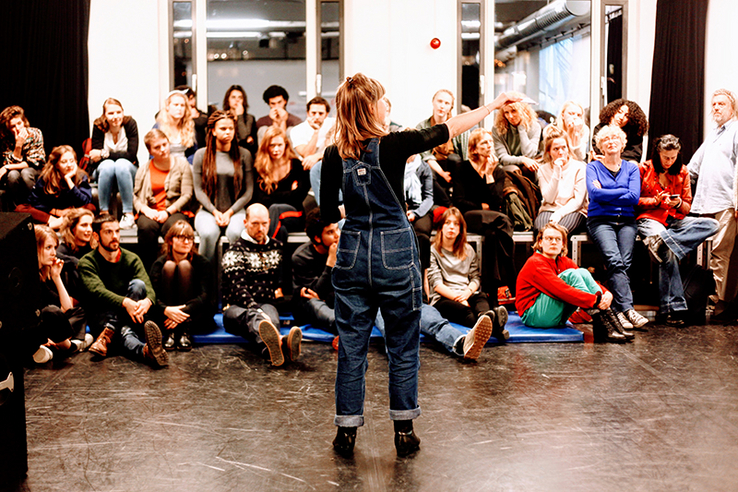A conversation with Mara van Nes (Student Theatre in Education) and Myriam Sahraoui, member of the Zina platform.
Adelheid Roosen’s WijkSafaris take you right into people's homes, where you find yourself in a partly staged, partly real scene in which an actor and a local resident engage in intimate conversation. Through these conversations you learn about the neighbourhood, and then you, the local residents and the actors get around the table to talk. Adelheid Roosen and Zina have been using this method, with great success, since 2012, creating on-site theatre in Amsterdam’s Slotermeer and Bijlmer districts, as well as Utrecht, Juarez, and Mexico City.
For the first time ever, Adelheid has handed over the reins to a group of thirty students. They will take the audience on a tour of the Banne and Floradorp districts of North Amsterdam. Issues that are part of everyday life here – poverty, immigration and crime – are the hot topics on every political party’s election manifesto. Mara van Nes, a fourth-year student on the Theatre in Education programme, started on preliminary research in the two neighbourhoods way back in spring last year. ‘I’d heard about Banne from news reports,’ Mara recalls, ‘and they described it as a “breeding ground for terrorism”. But I didn’t find anything like this kind of grimness when I visited. I think it’s scandalous how the press get away with stigmatising an entire neighbourhood. There are so many different stories and experiences co-existing here.’
Agree to disagree
These other stories are exactly what the students involved in WijkSafari hope to bring to the fore to make people a bit more aware of what’s really going on in the city. As project leader Myriam Sahraoui says, ‘Striking up conversations in which you respect other people’s opinions is more relevant today than ever before.’
Zina’s approach involves a form of temporary adoption, with each actor moving in with a local host for two weeks and getting immersed in that person’s life. If that means watching TV with them all day long, so be it. As Myriam explains, ‘What we achieve through this is a level of engagement that goes beyond first impressions. At first everyone’s on their best behaviour, with non-stop conversation to match, but that wears off after a few hours and then you both start to feel uncomfortable, with awkward silences and boredom. That’s when the process really starts.’ Laughing, Myriam continues: ‘It's like going on holiday with a complete stranger who has a completely different outlook on life.’
Beyond uneasiness and irritation lies the possibility of engaging as equals. This is exactly what happened in the Bijlmer last year when the actor Elly Ludenhoff stayed with the elderly Ghanaian king Nii Tackie. They did walk a razor’s edge, but managed to connect in the end.
‘A feeling of vulnerability is as much part of a WijkSafari as it is of life,’ explains Sahraoui, ‘And you have no choice but to acknowledge it and let go and see where it takes you. I took part myself the first time we did this, and my adoptive father fell ill during the performance. The adoptive father of one of my fellow actors Nazmiye Oral actually died during the adoption period, so that was followed by a forty-days period of mourning.’
Ten students from the Mime School and the School for Drama & Contemporary Music Theatre will begin their adoption period in March. Their relationship with their adoptive parents will be the basis for theatrical scenes to which students from the Theatre Directing programme will add some finishing touches. Third-year Theatre in Education students will be directing the routes between these scenes. And Production & Stage Management students are already hard at work in the neighbourhood.
‘It’s exciting to see the Academy of Theatre and Dance expose its students to this project, giving a new generation of theatre practitioners an infusion of raw, real life,’ says Sahraoui. ‘The students will be engaging with strangers in a really intimate way, so it goes way further than your typical site-specific piece. There’s no escape!’
Van Nes: ‘The last three-and-a-half years at this school have been the best in my life, but I was always aware I was in an ivory tower. This research period has taught me a lot about being human. I’ve been confronted with my own preconceptions, and I realise now that our identity is much more fluid than I’d imagined. I’ve met people that I never would have considered worthy of being characters in a play. One of the host parents is a man in his 70s from the [former white working class] Jordaan neighbourhood. He walks around in a tracksuit, supports his son’s efforts to become a singer, and mentors teenagers doing odd jobs in the neighbourhood for their community service. When I first walked into his home it completely matched all my preconceptions, but then he showed me his bedroom and it was stuffed with Virgin Marys and Buddhas. Turns out he was psychic and gave aura readings and lectures all over the country.’
interview: Hester van Hasselt


